|
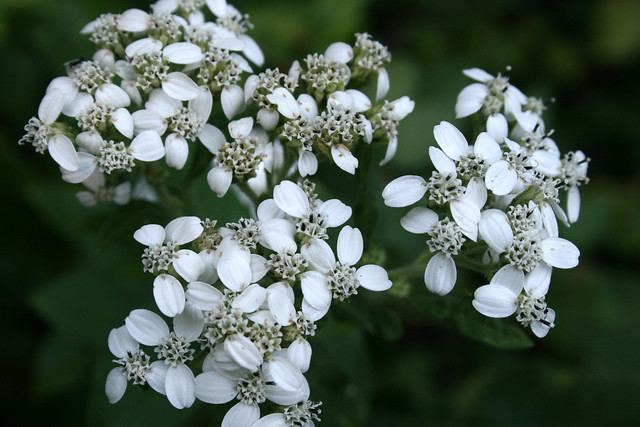
White crownbeard, Verbesina virginica. Bernheim Arboretum and Research Forest.
(*photo credit)
July 1, 2012 Little Girl, Arise! Feminine Aspirations Today
"Talitha kum!" which means, "Little girl, I tell you to get up." (Mark 5:41)
Earthhealing has a feminine quality that is not often mentioned. However, when hearing the Scripture passage of today, we cannot fail to see that the aspiration of this half of the human race must be addressed. Women involve that portion of the vast work force that is often overlooked or taken for granted, especially since they bear all or a major portion of childbearing, homemaking, and caregiving. Let's not quibble over whether the situations are improving in this or distant lands, but rather that reflection deserves added attention in this election year when women's votes are so courted and counted.
Women's health issues are featured prominently in the debates now ongoing -- and certainly the health of a nation of both sexes is an important issue, whether for those privileged with public or private coverage, or that glaring minority of people who exists as uninsured women or men. Certainly, proper care must be afforded to all, and that is paramount even when certain features of existing law are questioned and struck down. All need care and protection, and that is not too difficult to imagine through a one-stop national health care system. Let women lead the way!
Working conditions deserve review. Two-thirds of American women work outside the home at least for some time of the year. This can become an intolerable situation when women's jobs are terminated for childbearing or caring without recourse to legal protection. These good hard workers may be fired and or work with an open threat of replacement by childless women and those who do not have such immense responsibilities. Our nation must prepare for future generations with fair working conditions for parents.
Opportunities must be open to all. No doubt the aspirations of young women have expanded in the last few decades. The majority of college enrollments and degrees granted today are to women in many though not all specialized fields. Women are filling roles in the armed services that were not the case a few decades ago (though draft card requirements are imposed on young men unfairly). Women predominate in education and health care, but are sparse in elected governmental office and higher CEO positions in business. Often comparable men's and women's positions are not equally compensated.
Global treatment needs review. In many lands women are unfairly treated. Cultural rituals on female infants must be abolished; human trafficking and near servitude working conditions must be exposed and outlawed; in some places, women are not given rights afforded to the "heads" of households. The fight continues.
Prayer: Lord, extend to us the compassion Jesus shows to the woman with health problems and the young girl in today's Gospel. Help us to champion the cause of women when unfairly treated.
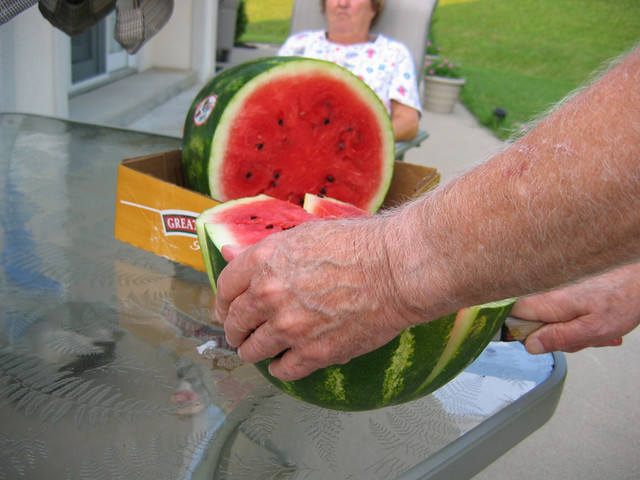
Enjoying fresh watermelon at July family gathering.
(*photo credit)
July 2, 2012 Celebrate the Fourth in New Ways
Besides fireworks, we may be at a loss in ways to celebrate the Declaration of Independence by citizens of the United States. Perhaps we could survey the way other peoples give special attention to their major holidays, but that is not a popular occupation because traditions differ and remain sacred. Perhaps it is better to consider little changes at various fronts, especially since this year the holiday is in mid-week and focuses more on a one-day event. Think individually, family/community, nationally, and even globally.
Individual: Read American history and especially the Revolutionary War story. We are always caught in amazement that our country was able to pull together over such distances of land mass and with such slow communication and transportation -- and to successfully wage a campaign of independence against the major world maritime power.
Family: Visit with relatives and friends some historic site within normal reach of your residence. This is a good time to see Gettysburg, or Vicksburg, or a scenic lighthouse, or a presidential birthplace or library. Much depends on what is within easy reach by travel, but the likelihood is very high that each of us has failed to visit some of these nearby historic or scenic locations.
Church community: A gathering for a special mid-week prayer for our nation, its people, and its leaders is so needed this year over others. Maybe the picnic could be a church-related one where newly arrived immigrants or visitors may be especially welcomed.
Broader community: This is the time for frequenting the local farmers' market or yard sale, since surplus produce is now starting to appear, and the bargains at a yard sale strikes one at this time of year. It is an opportunity to socialize with neighbors and July means a special celebration --the Fourth.
National: Get involved in the political campaign on the local, state, or national level. There may be a candidate coming to the area this week, so plan to attend and even have a prepared question or comment if the opportunity affords itself.
International: Cheer on a talented performer from another nation at the Olympics, so that competition for medals will take second place to a show of expertise by gifted individuals or teams.
Globally: We need to become a nation that acts as an example to others in the struggle to conserve resources and use these within our means. Our per capita consumption records make both those with growing disposable funds seek to imitate us, thus hastening the day of the tipping point of global warming. In fact, our country must take the lead in resource conservation.
Prayer: Lord, inspire us to say again, "In God We Trust."

Shafts of light reach the pipsissiwa, Chimaphila umbellata.
(*photo credit)
July 3, 2012 Focus Today
FOCUS
I try to pray, Oh Lord, to you,
yet it is a litany of what to do.
As I survey the overwhelming milieu
with moments too few, too few.
Again, I pray the liturgy of the day,
again as before the thoughts delay,
My feet of clay get in harm's way.
Please deliver me from this fray.
Battle plans, legal stands,
helping hands, threatened lands,
Endless fights, warring clans.
Who knows the time spans?
Make me like a moth going to the light,
make the night a cloak of might,
In the darkness keep it bright,
Focused clearly on a way-off sight.
We need to focus on our individual allurements that hold us back, our local community problems such as drug addiction in our region, our national issues of disparity of wealth, unfair taxes, and national addiction to consumer products, and our global catastrophe of human-caused climate change. Unfortunately, we can only focus on limited subjects. The temptation is to focus on the easier issues and give ourselves gold stars for taking such a route.
Postscript -- This poem was composed several years ago, and I am uncertain in which season. However, summer is my hardest time for focusing, and early July the peak of dissipation.
Prayer: Lord, keep us mindful of our duties and obligations as individuals and as a people committed to you.

The Statue of Liberty.
(*photo by Michael Bach, Creative Commons)
July 4, 2012 Religious Liberty for All
The issue of religious liberty is always something that must be guarded, for we as citizens and believers in human rights are meant to defend our American cherished religious liberty. At no time is this more worth considering than on this national day. However, some recent concerns and especially in adopting health care regulations has made applications of this issue somewhat fluid in the light of recent political and legal decisions.
The first draft of this reflection (three months ago) was based on the call of the American Catholic bishops to take responsible action on a number of emerging concerns. The foremost has been the Health and Human Services mandate forcing all employers, including religious organizations, to provide coverage of employees' contraception, sterilization, and abortion-inducing drugs, even when they have moral objections to them. Another example is driving Catholic foster care and adoption services out of business by revoking licenses and ending governmental contracts. Another is discrimination against Catholic humanitarian services. Still another involves laws punishing charity to undocumented immigrants and another to exclude a religious student group because it limits leadership positions to those who share the group's religion. And what is next?
These and many other such infringements on religious liberty should be exposed and every effort made by believers in true democracy to challenge policies and turn an aroused citizenry into activists. Hesitancy in taking on some of these issues has been because of the fluid situation of certain of these actions, some of which have modified after first proposed. A rash of national, state, and local policies are expected in a secular and materialistic society in which individualized acts of "freedom" or license take precedence over proper social controls and guarantees.
A society that seeks to protect the free reign of anything without regard for the commons and the interest of all parties soon finds boundaries exceeded -- and often at the expense of one or other tenets declared unpopular by a media drawn to material profits.
Governmental infringement on institutional religious liberty is coupled by that of trampling on individual liberties, e.g., the right to proper health care, employment, and adequate education. These become more complex issues but in this age when materialism is given high regard in a consumer culture, institutions that promote materialism receive benefits and tax breaks; those that defend the poor and voiceless are denied fair treatment and forced to endure barriers to proper functioning. Threats to liberty of individuals take on more subtle aspects than threats to the functions of religious institutions. Both series of threats must be exposed and opposed.
Prayer: Lord, teach us to be patriots of the 21st century, to guard our precious liberties, and to challenge the threats that confront us on all fronts.

The Letter Writing Alliance.
(*photo by Donovan Beeson, Creative Commons)
July 5, 2012 Writing Letters Still Has Charm and Value
As of this writing I am in the process of reducing a volume of past talks, meetings, correspondence, and notable event records -- for the sake of those who must clean up after me at a future date. In this tossing out of materials I note how careful we were decades ago in writing letters of introduction, negotiation for a speaking engagement, or thanks for favors. Often these were not just small notes but quite lengthy letters. One temptation has been to save these as souvenirs of the pre-email period, when we erase them now with little thought. Looking back, however, something charming existed in those days of careful composition and lengthy replies. Has the hastily jotted email erased the hidden charm of letters written and copied for records?
Think back to previous ages and the letters preserved by those in war that became printed diaries and books, or letters so well composed, such as between John Adams and Thomas Jefferson that
became part of American History. These were discourses, since mails were slow, distractions were fewer, and well thought-out policies were worth sharing with friends. Today we have blogs and mindless Twitter and even comments on the Facebooks of almost a billion sharers. Social contact is so much a part of modern instant and low-cost communication that some would call it revolutionary. Today's communicators are willing to spend money and time to keep their cell phone connected and bills paid -- but how much of this is quality time? It seems that, if we waste time together, there emerges a new form of solidarity.
Emails are so quick, even when sent for condolences to a distant acquaintance; they take composing and correcting but not with the finesse of the long hand-written letter. However, some of us have digressed to deteriorating penmanship and so the typed copy is better for the sake of the reader. Still, the phone call is often the more efficient way to make that needed communication, and we hardly think about letters for some mundane business. Email records have a more lasting impact if someone really wants to find out what was said at a given time in the past. Letters sent by snail mail or email certainly are more permanent than the personal conversation or unrecorded phone call. Time in communicating allows us to omit emotional outbursts that we regret later.
Each of us considers writing to certain people in a more designed and composed manner. But the task seems to become more onerous with time, with shaky hands, and using higher priced first class stamps. There are those certain types of business we do not want to open to the public traffic of the Internet -- and so we practice the art of letter-writing through the regular post. At times this is the right thing to do -- and there is charm in old-style posted letters once sent, once received, and twice cherished.
Prayer: Lord, you bless us with the wonderful letters of Paul and others with which we find the essence of Christian thought.
Grant us grace to continue writing letters for the benefit of all.

Remembering a trip to Alaska through snapshot.
(*photo credit)
July 6, 2012 Eight Ways to Remember Sightseeing Trips
This is the week many Americans are on the road and they are seeing the fleeting sights go past. As we travel we suppose that the sights are retained as though the brain is a video recorder. Not so! We may have some vivid flashbacks due to something memorable, such as a near drowning or road accident but the ordinary sights fade rapidly. Maybe these are pleasurable scenic sights that flash now and are soon forgotten. Let's retain a few.
1. Photographs are the easiest way to capture what it was like to "sight see" beyond the camera lens. Most often trips will mean something special in the act of recording them.
2. Diaries or daybooks can bring back the memories by referring to the actual scene and the mood we had at the time of seeing the sight. This can bring back vivid memories that include weather, types of trees, the spell of the landscape, and even moods and remarks made by traveling companions.
3. Memorable chats with local folks will be remembered by you long after the exchange, especially if you ask questions about some local history or other detail that make a lasting mark. This becomes a learning experience that will be treasured and recalled as long as the gift of memory is itself retained.
4. Souvenir that is either commercial or not. This could be a colorful leaf from a site, a pebble for your wall or walkway as a collectors item (though not taken from the exact memorial place or historic site), or a rock from a road cut, a geological souvenir that costs little. And then there are the commercial items.
5. Local food delights can be discovered by keen observation or inquiry, especially when patronizing mom-and-pop eating places or local bakeries or orchards. This act of eating what is local, whether wild or food prepared from local products, will make us part of the place visited.
6. Mark the map exactly on the day and place, and keep it on a wall in your room. All the major trips I have taken are recorded on a map and, when reviewed, this brings back happy memories of the trips taken, though some involved special events, which are generally remembered as choice memories.
7. Narrate highlights of the trip to friends or relatives so that by telling they will be implanted on the brain. If not kept humorous, this narration can be deadening, so at least make it the subject of prayer to a listening God after a successful trip.
8. Write letters of thanks to people visited or met. This becomes part of the record of gratitude that adds delight.
Prayer: Lord, let our memories never fade and, if they do, at least leave a trace of love that we can carry on life's journey.

Watts Creek, Woodford Co., KY.
(*photo credit)
July 7, 2012 Reflecting Near Water Sounds
Sounds of water affect us differently with each season of the year, from the snowflakes hitting the window glass in winter to the gentle April showers of spring, to the cloudburst of summer and the steady rains of autumn. Often running brooks emit their own unique sounds as well though dampened by summer foliage. Water sounds occur in all seasons but in summer's vacation let's listen closely.
Sometimes we need to visit the brook and try to pronounce the sound of rushing water, even if this is a challenge. In fact, the water sounds, whether soft or loud can soothe our frayed nerves. Water has an instinctive pull upon us; water sounds are a call to draw nearer to the brook-side and the need for nature's steady rhythm to offer healing relief. The rushing current of a river can energize us; lapping water can mesmerize us; a trickle can thrill us. Sitting at a river bank or riding a boat or listening to rain all serve a human purpose -- and summer is a good time to experience this. Think of the sound of a canoe paddle striking water or the splash of a diver plunging into a swimming pool.
More than half of Americans live within one hour's drive of large bodies of water, all of which could have the splashing, crashing, repetitive sound of waves hitting the coast lines. Again, waves sounding on shore touch our inner being and become a form of relaxation so needed and so sought. Other profound but quite irregularly heard sounds may be a gigantic and overwhelming waterfalls with its deafening roar that tells us how small we are and insignificant our concerns. What about other infrequent or off-seasonal sounds: the approach of a shower or rain storm heard from the distance; the rolling sound of incoming tide; hail striking a tin roof; crunching of snow under one's boots?
Some may seek out the outdoor natural water sounds and omit the water sounds of a boiling teakettle or a tub filling with water for a bath. The ones who get outdoors less seek access to natural sounds when possible and even look for ways to make water sounds in their own homes. They may have energy-driven (hopefully solar-powered) fountains outside on a patio or, if such is beyond their means, at least a domestic "waterfalls" or the gurgling stream of recirculating water to aerate the fish tank. Save and reuse the water, for a dripping faucet indicates wasted water and can become irritating over time; so can the hiss from a steaming pot that needs to be attended. Producing indoor water sounds is a creative venture in providing quality life to the shut-ins and elderly. All such water sounds in July weather can be soothing, delightful and even refreshing. Let's not forget that summer water sounds have added advantages over those of other seasons and hot weather makes them all the more welcome. Consider obtaining our book, Water Sounds from Marquette University Press (notice on this site).
Prayers: Lord, you give us life-giving water from the pouring at Baptism to the sprinkle of holy water. Make us ever more appreciative of the many sounds of water in our lives.

Scolopendromorph centipede, discovered under bark of tree. Lee Co., VA.
(*photo credit)
July 8, 2012 Prophets Lack Neighborhood Honors
This is the carpenter, surely, the son of Mary... "A prophet is only despised in his own country, among his own relatives and within his own house." (Mark 6:3-4)
The prophetic message and its difficulties return in today's liturgy readings (Ezekiel's hard message to Israel; Paul's thorn in the flesh; Jesus's words about his hometown opposition). True prophets had a hard time two thousand years ago and also today (see July 9, 2006; May 15, 2012) and so why return to this theme? The answer is simple: we need reassurance because we have major prophetic economic and environmental messages that the public (whether in this country or elsewhere) finds unwelcome. We need encouragement to speak. The Gospel passage tells about Jesus's situation, but is it so different from our own when we conceive of neighborhood as a broader world.
Again, as stated before, true prophets have a hard time whereas false ones are often popular and well-received by peers -- especially if telling what the audience wants to hear, namely, jobs will be plentiful; gasoline will be lower in price; the debt is manageable, no new taxes. Unfortunately, politicians do not aspire to be true prophets, and doubly unfortunate is that hearers don't want inconvenient truths to be even mentioned. The fault does not lie with the prophetic message, only with two things: the weaknesses of the people called to tell the message; and the weaknesses of the hearers of the word.
Is there any way to be prophetic and to grow a stronger backbone to speak, and a thicker skin to take derogatory remarks? Perhaps not. We pray that the prophets be true and faithful. Is there any way to make the hearers receive the message willingly? If they do not want to admit social addictions, then perhaps not also. If both speakers and hearers have difficulties what more can be said? The lack of honors and respect must not stop the prophet; instead he or she must acknowledge that it takes perseverance. If we believe we will be heard and received, then our faith is an empowering atmosphere in which the message is delivered. This is the type of faith that we are called to hold at this time -- the firm belief that amid all our adversities the Good News will be delivered and heard. Fidelity to the word and not the ongoing assurance of success is what move one forward -- and hearers who are sincere will be struck by a cloud of fidelity.
Climate change of human causation is an unpleasant message and some will deny this and find ready hirelings to "substantiate" their doubts. One must take such attacks in stride, and patiently expose the special interests promoting doubts. Exposing the merchants of doubt is not easy, and there are no honors in store.
Prayer: Lord, give us the courage to be vilified and still never let it stop our enthusiasm to spread the Good News. Help us have faith that word will generate action eventually.

Glade Sandwort, Arenaria patula. Cedars of Lebanon, TN.
(*photo credit)
July 9, 2012 Our New Fossil Fuel Addiction: Natural Gas
In March, National Public Radio quoted James E. Rogers, the highly influential CEO of Duke Energy (one of America's largest utilities) as being personally addicted to natural gas. Since he was ranked by Newsweek as one of the "fifty more powerful people in the world" maybe we ought to take note. His is a confession of addiction that we are calling for our entire nation to make, but his manner was not to be imitated. His was a boastful contrasting of gas to that of coal or oil (the latter then President George W. Bush declared to be our national addiction). Rogers was signaling a shift from coal to natural gas.
Natural gas was part of our Easter Special Reflection --
Remember that a "tipping point" [in climate change] is that point beyond which there is no recovery -- a runaway condition. Hence all programs related to energy conservation and renewable energy substitution must be undertaken post haste in order to reduce dependence on ALL fossil fuels, even the plentiful and highly popular natural gas obtained by the new fracking process. Since methane, the main constituent of natural gas, is twenty-five times more influential in greenhouse effects than carbon dioxide -- and as much as two to four percent of that gas may leak in drilling and processing -- the increasing popularity of that fossil fuel may actually be hastening the arrival of the tipping point.
The fracking process has allowed Duke Energy and other utilities large and small to have access to American natural gas in plentiful supply for the rest of the century without paying for security and transportation costs of obtaining distant oil. In a few years new drilling technology has unloosed vast quantities of natural gas locked in massive shale deposits under almost half of our states and Canadian provinces as well. Transporting this gas by pipelines and refraining from surface mining are godsends.
Wait a minute! Local added fossil fuel supplies with only small losses in drilling and processing does not bode a perfect scene. The added greenhouse effect of lost methane in this increased production is a hidden danger, not a better solution. Proceedings from the National Academy of Science says that uncombusted methane is a far more powerful greenhouse gas emitter than carbon dioxide. Any boasted advantage over coal combustion is most likely false. Assuming EPA estimates for leak rates, compressed natural gas-fueled vehicles are not a viable mitigation strategy for climate change because of total methane leakage from natural gas production, delivery, and the vehicles themselves. Let us hold politicians to acknowledging human-caused climate change and the need for renewable energy substitution and continued resource conservation measures. Time is limited and it is no time to be addicted to natural gas. Besides, the cracks in melting Arctic ice are emitting sizeable additions of methane.
Prayer: Lord, help us see our social addictions in fuel use, and be willing to address them in a forthright manner.

A colony of winged ants underneath limestone fragment.
(*photo credit)
July 10, 2012 Refraining from Constant Social Contact
There are times and places when we must be connected and we can thank God that such opportunities exist. We can call 911 when someone is in trouble or when a storm is approaching. Instant communication has its good place and no one will deny it. But are there not limits to all good things?
Distractions are rampant. All too often we hear from drivers about erratic behavior on the public highways and much of this caused by driver cell phoning or texting. Yes, I have done some distracted driving in dialing a radio station or peeling an orange. Shame, but I do not text and I am among the minority without a cell phone. Distracted auto driving can result in serious accidents and deaths, even from operating boats, trains, and airplanes. So often it is that busy work of being important and being in contact with other parties all the time that leads to such distractions.
Silence can be golden. Besides the dangers of distraction, the opportunities to look about, to observe surroundings, to take in the freshness of air, or the brightness of sunshine are all overlooked by this popular urge for constant social contact. Distraction goes beyond the duties of working, driving, and studying, and includes the times needed to reflect and be silent and to ourselves. Do many fear the silence as though the lack of contact may make them less socially connected? A compulsion to be together with friends has a good basis in communal life, and yet like all good things can be overly practiced.
Prayer is alternative connectedness. From a spiritual standpoint, communicating with the ever-present Lord does not require a cell phone or ipad. Prayer is a true alternative for it requires no sophisticated communication device costing money to purchase and keep maintained and secure. No, even the destitute can connect with God, and many do. Of course all human activity can be a prayer, but that is harder to achieve when distractions blot out the needed focus on God. Whose side we are on?
Space improves relationships. A feeling that big brother (even a loving one) is watching has an affect upon us. An overly observant parent does make life more difficult for some who want and value their independence and free time. Connectedness has a result of infringing on that freedom of being private when one needs to be. Space has its place in maturation and human development, and even in improving human relations -- for absence makes hearts grow fonder. Periods of time away from phones can clear the mind, settle nerves, invite private reflection, and give one the chance to collect one's thoughts. If totally connected with glue of the "blackberry" one might experience a rather miserable life. Think again you cell phones users!
Prayer: Lord, teach us the art of being truly authentic social beings, knowing when to talk and when to avoid unnecessary chatter, when to call and when to refrain from doing so.

Ebony spleenwort on rich forest floor.
(*photo credit)
July 11, 2012 Solastalgia: Stress from Local Environmental Assault
I hate coined words on which we stumble when we try to pronounce them. However, since people associate the newly coined one in this title with a mental condition suffered by many inhabitants of our Appalachian region who are plagued by mountaintop removal in their domestic surroundings, it may need introduction. It is akin to nostalgia (a longing to return home or for a condition of long ago). Solastalgia is a place-based distress engendered by unwelcome environmental change (G. Albrecht, 2007). It has been applied by a series of researchers at Radford University in Virginia to people living in the vicinity of coal-extracting mountaintop removal (MTR) operations and reported by Paige Cordial, et al. at the 2012 Appalachian Studies Conference.
Among the unpleasant findings discussed were: increased risk of birth defects in MTR communities; loss of common grounds, supplemental income, ability to garden and recreation opportunities; loss of family cemeteries; community discord and displacement; prevalent rates of serious psychological distress and other major depressive episodes; poor physical and mental health; and other environmental problems such as toxic waste dumps.
Each of these areas have had some degree of research on the effects and are all significant in that the testimony of the residents leads to clear signs of solastalgia. An entire neighborhood ranging from scenic view, roads, and all the normal environmental aspects of what constitutes "home;" this has been displaced and rearranged even for those who do not move away but are helpless witnesses to what the massive land-moving operations are doing to a countryside. As we have noted many times, Appalachian people identify with their land, something that is regarded as relatively stable and present long after each generation passes away. Experiencing a changing once-considered permanent landscape has a traumatic effect on a community of people. Some of the surging conflicts among these residents can be directly traced to MTR operations. The hills are leveled and the valleys filled -- and what were the haunts of former time are gone into a moonscape atmosphere seen on all sides.
I recall the experience of taking a person back to her family cemetery that had been damaged by logging operations and that was so very shocking to her. When the cemetery itself is lost in such massive land operations, the trauma is all the worse, for the sacred ties to the past have been broken. The trust that governments are meant to help protect communities is shaken. Researchers have conducted interviews where people express feelings of vulnerability, because they lack support from a once stable community. Interestingly, this entire area of emotional and mental damage to a community is never given the prominence of air, water, and land pollution problems in MTR cases.
Prayer: Lord, teach us to have compassion for all our brothers and sisters who are harmed by modern fossil fuel extraction.

Farmer harvests ripe tomatoes. Knox Co., KY.
(*photo credit)
July 12, 2012 The Joys of Harvesting
Over time on a half dozen harvesting reflections the subject has been nature's produce (10/14/08), wheat (7/13/06), corn (10/15/09), silage (8/6/11), hay (6/21/10), and even tobacco (8/12/06). It is not the specific technique and memories associated with harvesting that we consider here, but the joy in the heart that comes when gathering in produce. Scripture spoke of the sorrowing of sowing and the joys of harvesting, and that some would sow (without seeing results) and others would reap what they did not sow. Really, the regional harvest month is July, even though it is not necessarily the one consuming the most harvest time. However, in our part of the country, wheat and small grains are threshed (or combined) in July even when harvesting occurs in some form in virtually every month of the year.
Why joy, when harvesting takes more effort and sweat than sowing? One answer is that sowing has uncertainty involved; a store of precious seed is being dispersed without certitude that something will result from the action, and so the unpredictability and anxiety associated leads to a certain "lack of joy" found in the certitude of a harvest, whether moderate or generous. However, some poor folks must suffer without joy from some diminished harvests. Harvests can be times of great interaction and socializing, or at least the feat can be described in enlarged ways to listeners. And then there were the ample meals associated with the harvesting operations described elsewhere in these reflections.
The joy of digging potatoes, picking plums, shucking corn, gathering nuts, making sorghum, filling silos, "putting up" hay, and even cutting tobacco was not always immediately evident to the one doing the repetitive operation, but fresh air, sunshine, and final recompense did lighten and enhance an operation; the work allowed for an anticipated reward and a sense of gratitude for the plentitude of the event. I say all of this because non-harvesters have not experienced the "joy" of a harvest. Granted, this can be a good thing, if not done repetitively for long lengths of time. Laborers in the field may thank God for substantial rewards, but migrants and laborers do not always see fair benefits. Hopefully, those who champion harvesters' causes ought to have experienced the operation first hand so as to soften the rhetoric. Don't condemn the practice of harvesting without recalling the joy associated.
Joy includes gratitude to the creator for the opportunity to harvest (8/1/09), especially when a harvest seemed in grave doubt or the harvester is not fully fit for the work involved. Joy includes the act of gathering, though that is a simple joy that remains a mystery to non-agrarians or non-gardeners. Joy includes satisfaction for mission accomplished and the comfort of knowing that some provision has been achieved for the harsher weather ahead. Joy includes celebrations of what have been achieved.
Prayer: Lord, you invite us to simple moments of joy; let us
see these as prelude to eternity following the grand harvest.

Flowers of tobacco plant. Pin Oak Farm, University of Kentucky.
(*photo credit)
July 13, 2012 Attending to Smokers Who Are Killing Themselves
If the title were put in the form of a question many may reply to say "nothing can be done" -- and this reflection would end abruptly. The following is the result of a period of pastoral work and my own interest in the tobacco control issue (See Tobacco Days with reference to how to obtain the book on the Internet).
Depending on one's relation to smokers, I think various remarks, cautions, comments, exhortation, and charitable conversations could be made either to them or to others who could help smokers in given circumstances. Much depends on the responsibilities of the smoker, the willingness of smokers to recognize addictions, and the smokers' proximity to death.
Responsibilities: For those who have dependents, especially children, and whose parenting and means of support is critical, a friend, loved one, or relative may have a duty to remind the smokers of the need for staying healthy for the sake of others at this time. Duties include methods in which the addiction could be addressed (medication, counseling, etc.) and that it is important that cessation programs be started before it is too late.
Addictive behavior recognition: There is plenty of available literature to use in assisting smokers to acknowledge an addiction and to recognize the need for assistance and a Higher Power. In this matter, some basic remarks and suggestions could be presented depending on the relationship of the speaker to the smoker. Many addicts, including tobacco smokers, do not like to be labeled as such, and so efforts to help overcome this condition could be quite helpful for such individuals -- if performed by the right person at the right time. Encouragement may be given either to the individual smoker or to someone who is close to them. When they make the first meaningful move to quit, every degree of support ought to be offered.
Degree of Smoking Ill Effects: What about those who are well into degrees of lung cancer and its associated spread and side effects? Many smokers who near the end say it is useless, and so will continue the smoking addiction. A sense of hopelessness prevails after doctor, loved ones, and clergy have failed to change habits. Smokers need to be encouraged to quit even as the time shortens and recovery seems hopeless. Pray that the end will at least be a smoke-free one. It is always helpful to remind smokers that their caregivers find the smoking obnoxious and at least the dying smoker should consider the wellbeing of the caring personnel. We cannot tempt God by asking for a miracle, while smokers continue in the habit. Granted these remarks are neither definitive nor satisfying. We have to admit our own inability to solve problems alone and that all comes from God.
Prayer: Lord, help those who are addicted to all forms of substance abuse. Help us to size up individual and social situations and to assist when possible knowing our own limitations.

Roadside day lily. Rockcastle Co., KY.
(*photo credit)
July 14, 2012 Reclaiming the Commons: Eccentricity or Investment?
Do not fear to be eccentric in opinion, for every opinion now accepted was once eccentric. Bertrand Russell
The question is raised about our book-in-progress, "Reclaiming the Commons," that can be freely downloaded from this website. Some ask whether it is proper to write this before the eyes of the world, and thus opening it to be borrowed before completed. Eccentric, perhaps? But several main points in the book's content are candidates for progressive discussion, namely future progress, crushing disparity of wealth as a hindrance to democracy, and the expectation that the poor will lead in saving the environment.
Investment in the Future: The purpose is not to promote eccentricity, for who wants to do this? Rather our goals are to further the main points through an invitation to reflect on the inherent merits of the process of reclaiming the commons. With confidence in what is to come, I am convinced good planning for the future reclamation will be accepted as standard fare a few decades after my passing. In other words, this work is an investment in future practice, for it is not currently acceptable by a generation addicted to new consumer products and fearful of shaking the boat.
Disparity of wealth is a hindrance to our democratic process, and this is furthered by an uncontrolled capitalism that has become a state religion of much of the world. To break this fetish of kowtowing to the super rich with their tax havens and unfairly retained wealth that evades taxation is a major goal. Fair taxation would break the disparity and allow financial resources to be used to give needed jobs to the unemployed and spread some of this obscenely, cumulated wealth to those in need of a decent life.
This includes caps on wealth (hardly eccentric since it was Ben Franklin's idea) and on final wealth size after taxation.
The poor as revolutionary leaders is hardly a new idea when recalling that this is Bastille Day. It is evident that wealthy people do not have a sense of being poor or have forgotten a previous poverty condition. A demand for democratic process means that all participate in bringing about a more just society -- and the poorer folks are the majority, and sheer numbers are important. "Taking what is rightfully ours" when the emphasis is to take for the social group (not a greedy individual property) becomes a redeeming virtue. For the taker to be motivated by private enrichment is certainly a vice. The art of taking in an atmosphere of social justice is the act of correcting what is now unjust -- hardly eccentric. Wealth privileges must not continue if our democratic process is to be preserved -- and every effort must be made to eliminate these privileges.
Prayer: Lord, teach us the difference between being falsely prophetic and popular and being honestly prophetic with a hope that in due time the truth will appear and basic justice will prevail on this wounded Earth.

Crossing Lake Barkley. Cadiz, KY.
(*photo credit)
July 15, 2012 Missionaries: He Began to Send Them out Two by Two
Those who spread the good news have a delicate and difficult task before them, and individual souls acting alone find it doubly troublesome. We need the corrective support of companions because the movement is most often to an alien culture which has good aspects worth affirming and others needing to be exposed. Missionaries elicit mixed reactions with some showing encouragement and some ignoring or condemning them. Few missionaries receive awards; many live and die in remote places and unrecognized by the public at large; some are misinterpreted and violently opposed; others are soon forgotten by a clamoring world of wealth and recognized success. Missionaries are devoted to their inspiring founders and translate fidelity into a loving message -- and that transcultural bridge is often difficult to construct and maintain.
Breaking away from a destructive culture takes some close-at- hand support, because we need reinforcement in our efforts. What we leave is both good and bad just as what we enter in a new cultural setting. A person who has to go it alone (as often happens with prisoners of conscience) can endure faithfully but at a great price. If missionaries are to break loose from the prisons of conformity, they are driven to spread Good News, even when alien to a pervasive culture, and their efforts regarded by many as of little account.
The presence of teams of workers is superior to those acting alone, for there is the check of personal admonition, the ability to articulate positions with another, and the assistance needed to overcome physical barriers that stand in the way. Two can do the job better than one, and many like-minded people working in unison and through teamwork can be still better. In the work of Christian mission, both healing and teaching become paramount for one must see the glory of creation, the value of suffering and work, and the spirit-filled renewal of a fair and just system. Christian activities need team support because ground-breaking takes effort.
Earthhealers are missionaries, for the mission is to heal a broken world. No one wants to confront an established order and thus many remain tied in or associated. The healer must be in communion with the victim and at odds with the culprit -- and so there is a dichotomy that is drawn out in a world where rampant and highly unchallenged materialism plagues us in many ways. The distance traveled by the earthhealing missionary is not one of geographic space as that of culture, for to continue living without challenging a culture of death, disparity of wealth, and resource waste is to be close to it and adhering to its tenets. The call of the WE to stand together now extends to going out together to the broken world; we need support, and in our poverty beg for it. May many join the cause!
Prayer: Lord, teach us to be missionaries in the fullest sense, to affirm the message, to go out to others in need, and to
speak with conviction in spreading the Good News.

A lush carpet of green moss. Cumberland Gap National Historical Park.
(*photo credit)
July 16, 2012 Culture of Life versus Culture of Death
Earthhealing is an affirmation of life, a wounded but vital planet in need of life-giving service. We have treated this in countless ways among the 2,400 reflections over the last eight years. One additional way to consider our work is to see this as a contribution to extending the "culture of life." Without a living Earth other human-related issues become moot.
The culture of life is one where all proper qualities of life are enhanced in every way humanly possible. Quite often this refers to "pro-life" opposition to abortion in all its forms, and extended to oppose any willful termination of life whether by individual sufferers, caregivers or others. Further extension has involved "web of life" issues such as those of war and peace (especially the actions in Iraq in 2003) using the original thinking expounded by the late Chicago Archbishop Cardinal Bernardin. Furthermore, the culture of life has been applied to those who champion abolition of the death penalty. Some would like to extend the culture to include promoting healthy living in contrast to misuse of food, drugs, and other substances.
The culture of death, on the other hand, is mentioned in counter-distinction to the culture of life. Briefly, this culture includes those who promote abortion and dismissal of the personhood of the fetus at all stages of life, those who champion euthanasia or forms of mercy killing, those who show satisfaction at the death of certain criminals, and those who promote and profit from warfare in many forms. In an extended way this culture extends to all who forget about the rights of individuals and especially the destitute and hungry; they may consider such deaths as a form of population control. In fact, some would say that anyone who callously disregards life that extends to threatened and endangered animal species is participating in the culture of death.
Sensitivity is a precondition to the culture of life. People showing compassion (suffering with another) for all human beings and even for threatened animals and plants are partaking in the culture of life. This requires more than merely observing when life is threatened; it embraces a love of God's creation and a willingness to be of service in affirming and safeguarding life.
Pro-environment issues are consistent with extending the web of life, so as to appreciate all quality of life (See Reflection on September 6, 2011). An extended culture of death may even penetrate the philosophy of some who regard themselves as "pro-life." Perhaps the best candidates are those who follow merchants of doubt and their funded profit-making corporations. Those who deny anthropogenic climate change are practicing the culture of death through lack of prudence or deceit. If such denials lead to frustrating efforts to curb methane and carbon dioxide generation the case becomes more evident.
Prayer: Lord, let us be pro-life in all its forms.

Common ragweed, Ambrosia artemisiifolia.
(*photo credit)
July 17, 2012 Ragweed Control
July is the time for the familiar ambrosia smell of the ragweed, a familiar plant pest in this country and for that matter is all the global temperate zones. Actually there are many varieties of the plant. Many people show their allergic reaction to the generous supply of ragweed pollen and announce the season with sneezing and watering eyes. Sufferers generally know the source though they may blame the goldenrod, which produces colorful but less airborne pollen than the lowly ragweed.
This hearty ragweed plant produces immense amounts of seeds that some birds find as winter feed; beyond that benefit is the more weighty detriment of having increased its zone of growth to even desert and mountainous areas through irrigation, road penetration, traffic, and other modern human operations. The ragweed is not ubiquitous, but certainly aspires to be. It can cover vast areas of untended grasslands to such a degree that it can choke out more beneficial vegetation.
Mowing is obviously the one manner of control that is sought by many -- and the frequent lawn mowing populace will be able to control the weed within their own lawn but not around unkempt neighborhoods and abandoned lots. Mowing near the ground has to occur frequently or else the cut off stem will sprout and gain a seed head again within the normal growing season. Such cuttings do not eradicate ragweed but only control its growth to some degree.
I recall that parts of our pastureland on our Kentucky farm could not be clipped easily due to the severe terrain, and these areas became hotbeds for ragweed. In fact, it would act as an overstory of grasslands itself, something like a mini-forest which the livestock fail to eat and allow to go to seed. By late summer the stands in unmowed areas would cover the ground in a heavy overstory over the bluegrass that strived to grow as well.
One eradication method is to burn the landscape containing the ragweed after it is clipped and enough dry matter is available to burn. Actually this method is frowned upon in populated zones with no-burn ordinances but can work in rural unregulated areas. In such cases, the stems can be destroyed and the sprouting spoken of about is discontinued. Unkempt border areas deserve special notice, for these can become nurseries for the next crop of ragweed. All in all, chemical or biological control agents have not been found to do a specialized task and like all such controls have the propensity to also harm neighboring friendly plants such as sunflowers or cultivated garden produce or flowers. Make the goal of ragweed eradication to detect the plant early on and eliminate it before the flowering and pollinating stage.
Prayer: Lord, teach hay fever sufferers to see the good of each season in turn, to accept unpleasant pests that enter their lives, and to expect that all seasons require handkerchiefs.

Bond Falls, near Watersmeet, MI.
(*photo credit)
July 18, 2012 Renewable Energy: A Needed Climate Change Strategy
Renewable energy in all its forms will contribute to the reduction of the worrying climate change scenario and possible global tipping point mentioned on July 9, 2012. Actually, the present national energy policy (if allowed to continue with proper incentives) would be on a proper path for good energy policy. In fact, in the last three full years (2009-11) renewable energy sources grew by 27.17%; in contrast during the same period total domestic energy production increased by 6.72% (mainly natural gas +13.66% and oil +14.27%, but declines in nuclear power by 1.99% and coal by 7.16%). During this period renewables accounted for 11.74% of the total domestic energy.
The statistical picture for renewables is quite bright as reports from the U.S. Energy Information Administration show. The major hydropower contribution (over one-third) kept pace with the increase, but the second contributor (biomass) accounted for one-quarter of the total domestic renewables but was held to no major growth. As we mention elsewhere, it is wind power that is exploding with a growth of 113.92% in the three year span with solar at about the same rate but from a far lower starting base. The wind/solar combination is what is destined to replace the decline in coal and nuclear energy use. Geothermal and biofuels will also contribute.
The prospect of overall renewable energy growth will occur if tax and grant incentives are retained in this period of domestic budgetary turmoil. If all goes well, the renewable field will take over annually about one additional percent of the domestic energy production in the next decade. However, to keep from having major global problems, the U.S. along with the other major carbon dioxide emitters (China and India) must lead in tackling the emerging climate change problem. The trouble is that the transition to a renewable economy is far slower than what the urgency of the situation demands. Some states have reached and are exceeding their original renewable energy strategies for replacement of fossil fuels, but the plentiful fracting of natural gas supplies has played into the hands of Big Energy -- and this turn of events in the last three-year span may actually be hastening a tipping point.
While other means must be utilized to make consumers aware of their addictive habits and that conservation and efficient use of resources are matters of policy, still renewable energy promotion must hold equal weight. Quiz political candidates, especially those most prone to receive heavy contributions from Big Energy, to consider again renewable energy jobs, investments, promotion, incentives, and use whether solar or wind, geothermal or hydropower, biofuels (from non food sources) or biomass. Every effort must be made to cut fossil fuels use, and this ought to be a national priority that reaches beyond partisanship.
Prayer: Lord, give us insight on what to use, when to conserve, where to save, and how to encourage others to do so.

Wild huckleberry and blueberry pie.
(*photo credit)
July 19, 2012 Promote and Organize Green Picnics
Several years back a person who had completed a picnic came up with a huge garbage bag of Styrofoam plates and asked where we dumped our garbage. We were recycling virtually everything, and I said we had no such practice; the person was astounded that our nature center did not have a dumpster. Surely we generated garbage and disposed of it properly. This Styrofoam-filled world says much about picnics. Perhaps, we ought to reexamine the lowly summer picnic and how to make it as green as the foliage around us. Here are eight simple rules:
1. Choose a picnic location with the least travel possible. Chose a spot that does not disturb the landscape (generally but not always a designated picnic area) and where all materials generated will be gathered up and disposed of properly.
2. Obey fire rules. Quite often campsites provide grill areas for open fires, unless prohibited by specific permanent or temporary drought rules. The designated fire locations will be most helpful to keep from having a runaway blaze in dry times. Be prepared to preheat or grill materials, if the fire season demands no fires or only the use of propane heaters.
3. Have healthy foods home-grown and domestically prepared if possible. So often the picnic is the time to loosen on nutritious food rules with hot dogs, soft drinks, and a host of sweets and items normally not on the regular diet. If it must be for the sake of the picnic spirit, at least go light on junk food.
4. Carry in beverages that are best suited for the occasion. Refrain if alcoholic beverages are not allowed. Also refrain from soft drinks when fruit juices and lemonade and other prepared drinks can replace the commercial ones.
5. And now the dinnerware. Most like the disposable items for there is less worry associated, but we recall that in older times it was always the plates and silverware that could be taken home and washed that evening -- and considered normal fare. How about being green and doing the same again? Yes, it's a challenge!
6. Keep the noise to a minimum so as not to disturb nearby picnickers. Some enjoyment and laughs and shouts are to be expected, but direct the youth to places away from the immediate picnic areas for before- and after-picnic fun and games.
7. Choose activities that more can participate in as post-picnic events -- and reduce the call to be overly competitive.
8. Upon preparing to leave, patrol the grounds to make sure no trash has been left inadvertently behind. Green can be fun!
Prayer: Lord, teach us to see the need to have picnics and
eat meals in order to enjoy the summer and cement relationships.
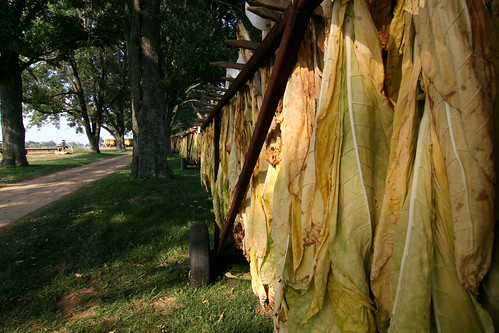
Tobacco plants, in preparation for drying.
(*photo credit)
July 20, 2012 Deworming Tobacco Plants and Praying Mantises
Warning! Please accept my regrets but this reflection may be uncomfortable for those squeamish about worms. Some wince over worms and others of us are most fascinated by them, for we need earthworms to fertilize and aerate the soil and we know these become the food for birds and other wildlife -- and good bait for fishing. Also for gardeners, worms can devoir produce and are regarded as pests that we must rid from the patch, either manually or with friendly insects with voracious appetites to consume the aphids and other garden harming creatures. Here we couple "deworming" with the praying mantis (a colloquial term).
One of the July tasks when we were farm youth in the 1940s was to deworm the tobacco patch. I have read accounts that some young people who hated their farm chores regarded this as the most distasteful work imaginable -- and, if they didn't know how to properly dispatch the plump "green horn" tobacco (or tomato) worm then that would have been a case of being splattered with tobacco juice. However, by merely pinching the insect right behind its head and decapitating (not gross) and tossing the worm, not a single drop of worm juice would touch body or clothing. If one never learned the art, then I pity them. So sad, they were so poor learners of an art that would have allowed better memories.
Environmental benefits came through the human touch, since no pesticides were demanded when people dewormed by hand -- adding to the slightly better condition of organic tobacco as smoking material. The absence of pesticide applications was ideal; when heavily plagued by the worm my dad and workers did use "Paris Green," an inorganic arsenic compound, which was toxic enough and led to a sickening condition on hot humid summer days. The truth was and still is that manual deworming is the greenest approach to plant maintenance, whether tobacco or garden produce.
The praying mantis is an unusual looking "friendly" insect with a long thin body and a large head and claws that clasp themselves in a prayer-like position. However, prey could be fooled. The praying mantis is generally the color of the foliage and will remain motionless and camouflaged until prey approach and in lightning speed grasp the unfortunate insect (and larger prey as well) with two grasping spiked forelegs. They are quite choosy and only eat what they themselves have caught; they can be cannibalistic with male mates who cannot escape in time. Again, praying mantises are excellent deworming agents. In fact, in chemical-free patches of productive vegetable gardens these creatures are prized and introduced; they flourish and they target other bugs and pests of many varieties. Why do the physical work of deworming if a friendly associate in the insect world will do a better job? Early in life I realized the benefit of having numbers of these unusually observant and odd looking friends around.
Prayer: Lord, teach all of us to help maintain the world around us in ways that are the least burdensome and most enjoyable.
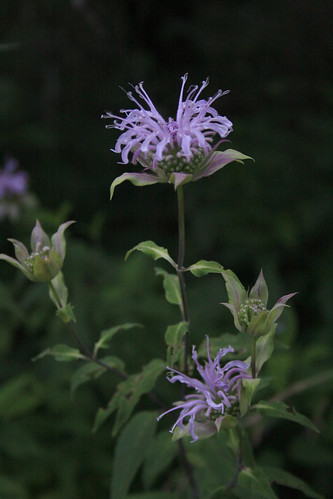
Wild Bergamot, Monarda fistulosa, native Kentucky mint.
(*photo credit)
July 21, 2012 Mint: A Summer Beverage of Choice
Virtually all types of mint are easy to grow and harder to stop growing everywhere in our greenspace. Mint does have a good flavor and many of the types are excellent hot or cold beverages without the added effect of caffeine. We wish the best for coffee growers and drinkers and hope that efforts to reduce middlemen prosper. May this provide a fair living wage for modest-income growers and comfort for habitual drinkers. My doctor advised me to lay off coffee because of over stimulation of my nerve system -- and coffee was becoming addictive.
Just like promoting home gardening over farmers' markets, so mint growing for beverage use is preferable to coffee or tea for several reasons: mint is locally produced with control of its growing conditions; homegrown mint is lower in price than imported coffee of whatever production and marketing scheme, and economy is locally based; and mint drinks can be tasty and yet lack caffeine that many find worrisome. Besides hot herbal mint teas discover cold mint drinks (e.g., blackberry and mint tonic) or mint-flavored water, a July preference. Note that the Kentucky official drink is the "mint julep" made with bourbon -- a summer special.
There are many varieties of mint (spearmint, peppermint, apple mint, etc.), most of them able to proliferate in temperate zones. The likelihood is that there is a favorite wild mint in or near your backyard inviting itself to become a summer drink. Some people would prefer a more pronounced minty flavor and others a milder variety so such choices halt any effort to judge this or that to be a "better mint." Grow your own variety and consider inserting six inch metal or plastic guards to keep roots from sneaking into unwanted areas. Mints can be invasive and exotic.
For about three months from April through June and a little more on either side there is a growing span before the mint goes to seed and the leaves lose some of their potency. One suggestion is to harvest mint leaves by cutting the stalks and stripping the leaves that are air dried (without pulpy stalks) away from direct sunlight, and perhaps to complete the process with a solar or standard food dryer. Package the dried leaves so as to retain flavor. Virtually any part of this country is what the Spanish called the San Francisco area, "yerba buena" or good herb -- and mint holds the distinction.
Beverages are a major mint use, but the herb can be used for a variety of other tasty culinary delights from salads including bleached summer produce such as green beans with oil and vinegar and pepper along with mint leaves. Besides our familiarity with mint-flavored gums, we find mint in cookies of many varieties, candies, puddings, cheese cake, pies, soups, and even my regional favorite prepared product, cornbread.
Prayer: Lord, you give us all good gifts and so often we
overlook those closest to us. Help us discover and use them well.

Sheep at Shaker Village of Pleasant Hill, KY.
(*photo credit)
July 22, 2012 They Were Like Sheep without a Shepherd
The situation was fluid. The hunger for proper moral leadership is the central issue of today's Gospel passage (Mark 6:30-34). A vast crowd came to Jesus eager for advice. At that very time the disciples had returned somewhat excited but exhausted, and Jesus was attempting to provide them some rest time -- something certainly needed after their mission experiences. However, plans were abruptly changed when crowds followed and demanded attention. Urgency took priority! Rest must in some circumstances be delayed and allowed to await an eternal rest.
Shepherding as a means of control or an exercise of power is certainly NOT what we are talking about here. Overly protective parents or leaders who want to dictate choices to underlings may have a sheepherding instinct, but that is different from this situation. Earthhealers do not have time to seek out groups of human "sheep" in order to control them; rather, we need to see multitudes already milling about seeking some form of leadership. The media and all with profit motivation see commercial and audience opportunities; wandering "sheep" are worth herding and the results can prove misleading and even disastrous.
The current situation calls. The challenge for us is to discern the difficulty of the task of teaching and guiding these wandering souls. It might take the unpopular practice of "tough love," of breaking the chain of addictive behavior that allures many away from the good path. We can act like Jesus did even though the situation is somewhat different. Individuals need the saving power of grace; so do entire cultures that are now being enticed to follow the consumer culture of the West with its wasteful use of precious resources meant for the present poor and future generations. The addictiveness of a consumerist culture grows when catering to insatiable wants of a middle class with money within the materialistic culture of expenditure.
Real need inspires us to act. We would like to stop and simply rest, but the urgency of saying what must be said in a teaching mode is of utter importance. This desire to rest or forego rest trumps traditional retirement. Certainly if we have good health and the Spirit moves us, we are to sacrifice personal rest when the good of others is demanded. Saving our wounded Earth is just such a circumstance and, if we have the energy to act, we must do so as the Spirit moves us. We need to neither seek to gather an audience where one does not exist, nor to run from the scene because our teaching may risk being fruitless. Rather, we must believe in the power of the message, Good News to capture the wayward spirit of so many beset by conflicting voices. God is certainly in charge and will triumph -- and we are messengers through acts of shepherding when needed.
Prayer: Lord, give us eyes to see the multitudes, insight to know their needs, courage to speak to them, and faith that good
results will follow though often not in our lifetime.

Starry false solomon's seal, Smilacina stellata.
(*photo credit)
July 23, 2012 Olympic Games and Playing to Win
Olympics need comment. You mean almost 2,400 topics and not one reflection on competitive games or the Olympics or related venues? TRUE, but one must remember that I never in my life liked competitive games: they were either too stressful for the heart or not worth all the effort because somebody I feel sorry for had to lose. But opposition is deeper: these games make one think that this is a serious activity when the real "Olympic" game of saving our Earth is deadly serious and the outcome is still truly in doubt. People play small games to have a good time, relieve tensions, be sociable, or get sunshine and fresh air; fine! The big games with outcome in doubt are truly worth engaging.
Why play to win? When folks regard winning as proving the righteousness or excellence of some system or institution or nation, I find this revolting. No wonder the world is in such a greedy and self-absorbing situation, for people play to win for very wrong reasons. If people come together to sincerely praise a good game and players, that is praiseworthy. If the contest is waged for imperfect objectives, we ought to be deeply suspect no matter how large the cheering audiences. This is not togetherness but rather reaffirmation of a capitalistic system promoting such events. And for what reason other than $$$?
Play real games. Merely disdaining local, national or global competitive sports reminds us once again of the vast game of haves and have-nots. The game is weighed in favor of the haves and their security forces, unfair tax systems, and disregard for the other party. Things are right now stacked against the have nots -- but not forever. It is time for the poor to win but not to compete, to cheer but not ridicule others; to champion and not to overlook those in dire need. Playing is important and winning is a byproduct of good play, not the ultimate goal on which all depends.
Play to win big ones. It is all in what you are playing for or cheering for -- and that makes a difference. In some countries pitched battles occur over soccer matches (though it is better than actual warfare). In some places parents pounce on umpires and referees and maybe it is a little better than not being interested in offsprings' performances, but only a little better. In counting numbers of gold medals per nation there is a nationalism that is hardly worth the beating that athletes have to endure in order to win for the nation; certainly better than sacrificing youth to the gods of old in Mayan events.
Change the rules. Every four years the Olympics (of which I intend in 2012 to watch little on TV or Internet) brings back the reality that the biggest game being played today is to save our planet from the destruction of other performers who want to steal resources and ruin the environment. Let's play to win the big one.
Prayer: Lord, teach us the art of playing to win so that the
major games are recognized and found for true victory.

Researcher examines nodules on soybean crop.
(*photo courtesy International Institute of Tropical Agriculture)
July 24, 2012 Soybeans Are Also a Green Food Crop
One of the ways we can radically share resources in the world is to grow the more intensive food crops that take far less space and pack far more protein and nutrients per amount of limited land resource. Thus while many livestock-producing operations take extensive land resources for pasture, hay, and feed crops, others, where flora are the major portion of a diet for hungry people, are more effective according to amount of land resource used.
Comparison with peanuts -- On January 19, 2012 we reflected on the role of peanuts as ecologically green food; so also is the humble soybean that has been used for five thousands years in Asia as a principal food crop While soybeans are comparable to peanuts for culinary versatility (tofu, tempeh, and miso), in nutritional content of protein, calories, fiber, and supplements, and for the leguminous nature of both crops (adding nitrogen to the soil), it has the added advantage of being less allergic than peanuts. Soybeans are regarded as safe, highly nutritious, and rich in fiber; this is the only plant derived food that contains all the essential amino acids like meat, and it also contains the phospholipid lecithin.
Animal product substitute -- Soy milk looks like and tastes close enough to ordinary cow's milk, and is directed to those with lactose intolerance. However, soy milk lacks the calcium of the animal product though that can be supplemented by greens (collards or kale) or other foods. The product takes far less effort to preserve, and animal demands required for dairy milk (animal living space, methane emissions, feed, water, medications, and waste disposal) make soybeans a consumer choice in a land-short world.
An American crop -- The United States is the world leader in soybean production (35% of world production or 90.6 million metric tons in 2010), followed by Brazil (27%), Argentina (19%) and then China and India in smaller amounts. The American crop is used at home to a limited degree but most is exported along with that of Brazil and Argentina. High production does not mean that soybeans have popularity in American foods as does peanut-containing candy bars and snack foods. However, one can expect more soy products in coming years beyond soy milk and soy sauce.
Adaptability -- Soy beans roasted can have the same snack value as peanuts and many other components of trail mixes; they do not require cooking when on hikes and exploratory expeditions. And soybeans are not as enticing to wild bears as are peanuts.
Nothing is perfect -- Large intake of soy products could affect people with impaired thyroid function and could reduce testosterone levels in men, and also some people with kidney disease. Moderation in all things, especially eating habits.
Prayer: Lord, guide us to conserve land resources, to eat good foods, and to share soybean products with a hungry world.

Common morning glory and asters make for uncommon bouquet.
(*photo credit)
July 25, 2012 Earthhealing Is Democratic, Not Elitist
In the course of these reflections we have done at least two dozen or more selections on characteristics of Earthhealing, modes of thought associated with it, victims to be addressed, virtues to be extolled, and ways of bringing about participation by the people involved. Our Earthhealing should enhance our democratic activities. Since this is "work in process," we need to occasionally review non-democratic tendencies ("elitism") and reaffirm our joint participation in renewing our wounded Earth.
A variety of elitist eco-spiritualities define one's motivation for responding to the environment of which four are listed here:
* Privileged or religiously driven elites call for using up resources for they will be gone anyway, as though privileges of elite control surpass use by poorer folks who do not appreciate resources as much as the current "ennobled" users.
* Intellectual elites hold that a rational insight will make the world better, if others would only see this and abide by it -- as though a concept of creation would change behavior in such profound ways -- truly wishful thinking.
* Autocratic elites, whether Western or Chinese-type capitalists, regard their edicts and controls as sufficient to correct the damage done in our broken world. The experts are in charge and merely pressing their points would allow the parsing of proper resource use to the multitudes.
* Media elites choose stories and outcomes in ways that are quite subtle and involve exclusive clubs, popular events, publicity of superstars, importance of CVs, recognition of authority, and unconscious biases against certain groups of people.
Earthhealers must guard against succumbing to control mechanisms. Democratic process is fragile and suffers through elitism, and thus must be addressed forthrightly or else an elitist culture misinterprets results and promotes democratic practice as a form of elitism itself. Due to such tendencies in our materialistic culture, we must confront disparity of wealth that seeks to control purse strings of all process and even Earthhealing itself. Three authentic principles must be left operative:
* All creation is affected by damage to our planet; our purview is the entirety of creatures from plants to animals and their interrelated habitats.
* No suffering or effort is ultimately lost for all leads to gain and thus democratic work done on all levels, even that of the most humble, can lead through redeeming to healing and renewing.
* All must participate because democratic process is open and dynamic and needs interaction by a variety of cultures and ways of thinking and doing. In theory all citizens need an active voice.
Prayer: Lord, teach us to be ever vigilant of the needs and contributions of all people, and to draw them into the saving work.

Simple pleasures in newly-gathered corn.
(*photo credit)
July 26, 2012 True Democratic Process: The Poor Must Lead the Way
This is a continuation of yesterday's reflection that Earthhealing must be preserved as truly democratic. A corollary to the aspect of participation is that the vast majority of the world, the poor, must lead the way -- a reckoning coming from the Magnificat that princes will be brought low and the lowly raised up -- a truly democratic "revolution." (See DVD listed at our website on this subject). Is this to occur by miraculous means? The realization will occur most likely beyond my lifetime and so I will not venture when or in what manner.
Our approach is that Earthhealing moves in the direction of changing wills more than a mere rational insight for overcoming the ignorance of the multitudes. The focus is on the basic cause of materialistic greed and desire for abundant material possessions; this is the motivation of middle and upper classes to continue on a course of becoming super-wealthy. The Resurrection-Centered approach calls for profound renewal by all who must become poor in order to see, speak, and act in ways that bring about healing. We fail to gain control of destructive tendencies because we fail to admit our addictiveness and need for a Higher Power.
This admission must be made by all people because we are either party to the addiction or tolerant of its impact on our neighbors. By admitting to be poor before the presence of the Creator allows us the space to accept our powerlessness and then be open to the merciful gift of empowerment wherein true healing may occur. The fact remains that some people are farther on the road to recovery than others, and some of these are ex-addicts of this world -- not the power elite or the intellectuals, or the wealthy. Only our admission to being poor will give us the atmosphere in which we find ourselves fully trustful in God and needing Divine Grace.
The heart of the quest is that of coming to be like the multitude and not to stand out apart from them and seek to have a competitive advantage over them. Democratic grassroots occurs when we all accept the addictive nature of the consumer culture and how much it has affected us and our beholding to a capitalistic economic system. This leads us to solutions: the disparity of wealth must be abandoned through fair taxes; the poor of the world must be given access to essential services; and ways found to totally disrupt materialistic practices and security systems fostering them. A true spiritual revolution must be promoted at every turn possible, and only the discomfort and dissatisfaction of the poor multitudes will lead the way. We can hardly expect that the contented and wealthy will take the initial step. We must become poor and lead as agents of change within the poor masses.
Prayer: Lord, teach us to be true revolutionaries, not looking for power or fame or fortune, but for the improved empowerment of the poor, a satisfaction in being poor, and a way to give all
people on this planet a fortunate higher quality of life.

Vivid colors of the monarch butterfly, Danaus plexippus.
(*photo credit)
July 27, 2012 America's Different Moral Attitudes about Wealth
Jesus appears hard on those who are wealthy and is this justified? As the presidential and other elections move into high gear, one must make some moral distinctions about higher or lower taxes or "job generators" by those allowed to retain their wealth.
Is it envy to desire what the wealthy have? Is a distinction in order? It is, if one believes that it is right and a goal of all to be super wealthy, continue playing the lottery, and strive to envy the wealthy. However, to want to have the power of the greedy and the retainers of wealth is truly a vice. To say that super wealth is wrong and that retention of such financial resources by a few (whether earned or not) is something worth liberating for the good of all (NOT greed of the takers) is the right road.
Social justice demands virtue. Here is where many of the revolutionaries of the past have gone awry. The unmerciful are either spiteful and want the destruction of the wealthy (French revolutionaries of the 1790s); or they are secretly desiring the same forms of control now exercised by the privileged, but to do so in the "name" of people, nation or another tag. Mercy and honesty in working together could allow a habit of doing justice as a community with some enforcement mechanisms to allow for public order. We need an orderly redistribution of wealth.
Prosperity Christianity, a handmaid of the capitalistic state, calls for accumulation in a "legal" way so that the property belongs to the wealth-acquiring person who is regarded as virtuous in obeying the law (instituted by privileged associates) and using his or her wits and powers to manipulate money in a supposed charitable fashion. For such "Christians," success is tied into their hidden greed, and others who envy them are sinners.
Social justice Christianity says that wealth itself retained and controlled as such is not a virtue, but is a resource that must be shared as part of the commons, especially with the destitute. No one can possess wealth at his or her own discretion especially when the wealth resources are needed to meet needs such as adequate food, potable water, and proper housing. Since one to two billion people fit these categories, it is unjust to retain (rather than merely acquire) superabundant wealth that ought to be shared. Taking for the commons is a virtue; failing to do so is a vice.
Which side are you on? The suspicion is that many readers would prefer not to make a choice as to how to share, for there seems to be much at stake: to decide against prosperity Christianity may distance us from successful friends and relatives. However, saving the rich, like camels passing through the eye of the needle, is a matter of concern and mystery.
Prayer: Lord, give us the courage to stand for social justice
in times when so few have much and so many more have so little.

Ladies tresses, Spiranthes ovalis. Washington Co., KY.
(*photo credit)
July 28, 2012 The Role of Liturgical Chant and Cosmic Vibrations
I doubt whether at the end of the 20th century I would have written this reflection, or even considered this issue. But certainly on more recent reflection, chanting is a continuation of the resonance from the first Big Bang, and thus allows us to be in tune with grand cosmic sounds. Chanting, like speaking in tongues, or caroling, or campfire sing-alongs, is part of affirmative sounds well worth their breaking of silent space.
Chanting has returned to our American church in this decade and in some ways I find it gratifying. It is not that I am a good chanter wanting an opportunity to excel. Rather, I am a modest songster from a talented family that never really invited my use of limited talents, and yet now blessed with a music director at one of my churches who encourages the celebrant's contributions. The congregation seems modestly appreciative that we have opportunities to have chanting response at various optional parts of our Liturgy -- and this gives such events a more sacred atmosphere.
Chanting is defined as a simple liturgical song (psalms, canticles, or proper prayers) in which a string of syllables or words is sung to each tone. The quality of a chanter's voice and efforts gives special meaning and formality to the occasion and allows for all to enter in arenas of active response that prolongs the solemnity. Chants such as Gregorian Chant have held a special place in the formal prayers of the church, but has been reduced in importance during the reforms following Vatican II. Well performed chants by monastic groups are valued, and their records sell in substantial numbers; in some cases enough sales of records allow for furnishing needed building programs in their religious establishments.
Good chanting is valued; moderate chanting leads to prayerful environments; imperfect chanting calls for improvements and added chant practices. Now efforts are being made to return chants during Masses to their proper role and duration, and this can counter some of the informality that crept into the Liturgy in the past half century. In a broader outlook, liturgical chanting is healing for a troubled planet. To chant is to enter into the vibrations of a planet in the process of being healed; the soothing tonality of chanting when done in a satisfactory manner can lead to communication with God. Our growth in trust assists us to recognize our social addictions and opens the way to addressing them with an open heart. We discover that our chanting is part of our human search for the eternal in a world in which we hold a vital role; it is the whimpering of an infant for a mother's milk, a humming in tune with the residual vibrations of cosmic origins, the long held desire to enter into the presence of God, the admission of wanting to overcome our collective imperfections.
Prayer: Lord, bring us in tune with a world resonating with marketplace chatter, fits of anger, and voices in despair. Make our chants signs of hope in a troubled world.

Hand-made loaf of bread, fresh from the oven.
(*photo by Steven Lilley, Creative Commons)
July 29, 2012 Insights into Jesus' Multiplication of Loaves
Then Jesus took the loaves, gave thanks, and gave them out to all who were sitting ready; he then did the same with the fish, giving them as much as they wanted. (John 6:11)
Every time we reflect upon the great feats of Jesus' two grand multiplications of the loaves we are able to draw ever deeper insights, some held of old and some uniquely fresh. Far better are just a few expressed insights new or old, not their uniqueness:
Sensitivity -- Jesus notes the approaching crowd and is aware of their need to be fed. It is profoundly Christian to see people in need and to initiate a process of fulfilling those needs;
Doubt -- The disciples have no idea how such a group can be fed in any meaningful manner. All too often we doubt that the destitute of the world can be served through the limited means at our disposal, but we must have faith that it can be done;
Generosity -- The youth is willing to share the little that he has for the greater good, a prime example of radical sharing;
Organization -- Making the people be seated (in Matthew's Gospel in formal groups for proper distribution) gives rise to how distribution must be available to all, but recipients may be required to undergo some structuring;
Gratitude -- Feeding in all forms ought to occur within an atmosphere of thanks to the Supplier of all good gifts. We ought to begin our meals with thanks for having food to fill our needs;
Plentitude -- The people who seek nourishment are filled and still have plenty left over. The resources of the Earth are sufficient for all to have a plentiful supply, if we have the will to distribute these resources properly;
Wants and needs -- A very minimum in any redistribution scheme is to satisfy basic essentials to all people, but it also implies that beyond are qualities-of-life needs that must be addressed.
Conservation -- Jesus may have multiplied loaves, but that does not mean surplus is to be wasted, and especially food. Too often when we have enough we become insensitive to future needs, and thus see excess as of less worth. A filled belly still must prepare for future needs;
Failure in spiritual understanding -- The people are filled with material things but in the greater part fail to understand the deeper spiritual message. This is the aspect of materialism that keeps people unaware of looking beyond their belly and individual and often selfish needs and wants;
Escape -- Jesus would have none of the glamour and forceful adulation of the crowd, and he simply removed himself from the scene so that the stage would not become politicized.
Looking ahead -- The multiplication prefigures the need of a people for spiritual nourishment in order to be strengthened for the many tasks ahead in renewing our troubled Earth.
Prayer: Lord, teach us ever deeper insights in our reflections on these magnificent events in your public life.
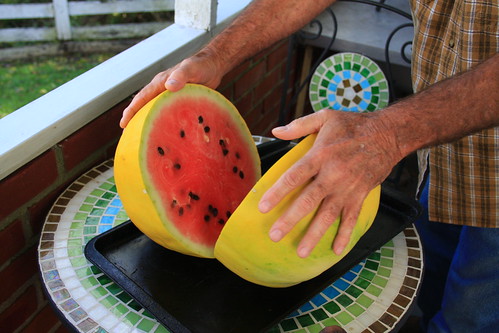
Yellow version of the heirloom "Moon and Stars" watermelon.
(*photo credit)
July 30, 2012 Enduring Increased Frequency of Weather Extremes
What do we do as threatening weather approaches? My own conduct is somewhat unpredictable. Though the chance of being struck by lightning is greater than winning the large jackpot, I do stay away from being under trees in a lightning storm -- and refrain from throwing money at the gambling allurements. Others act differently under such extremes as is evident at standing in line for lottery tickets or playing in the rainstorm.
Short term -- Be Prepared. Depending on where located, each of us ought to consider the possibility of certain weather extremities that could strike. It is wise to make remote preparations for necessary supplies, immediate shelter, and evacuation routes. I live downwind from the Bluegrass Army Depot; though chances of mishap are low, still evacuation routes and plans sent each year for us who reside in Estill County are salutary and worth keeping in a prominent place. That was especially true this past March when severe tornadoes were reported with a 10 (high certainty) rating of a strike within 50 miles. When some tornadoes were reported in the Army Depot area, it did make some of us concerned -- especially since where the strikes occurred in two sides of our county caused massive destruction (East Bernstadt and West Liberty) and dozens of deaths.
Medium term -- Be prudent. Besides shelter and evacuation, longer-term types of extremities may mean being prepared for flood or droughts to our gardens and landscape. Generally, these are concerns that will occur over a time period and thus there is some forewarning for weeks or days in advance. The season is prone to thunderstorms, and so keeping sensitive digital records at another place than the immediate site of computer access is a habit. And we pull plugs in times of storms as well. I keep duplicate copies at a distant location just in case the magnetized effects of an immediate or nearby strike were to occur in this vicinity. This is a matter of concern in our part of the country.
Long term -- Be responsible. Scientists show that extreme weather conditions have occurred with greater frequency over the past decade. Physical research, statistical analysis, and computer simulations have reported in the journal Nature Climate Change that extreme rainfall and heat waves occur due to global warming. Furthermore, these scientists from Germany's Potsdam Institute for Climate Research find that such phenomena occur in all parts of the globe. They report that severe floods, heat waves, and other phenomena in normally temperate climates are occurring with greater severity and frequently, e.g., record hurricanes in 2005, hottest Russian summer in 2010 since 1500, and 14 major United States weather events in 2011 costing over one billion dollars. One could add the severe 2012 winter in Europe as an example.
Prayer: Lord, teach us to live in current conditions with a good spirit, to be prepared for what could come tomorrow, to be
prudent about next week, and to be responsible in present times.
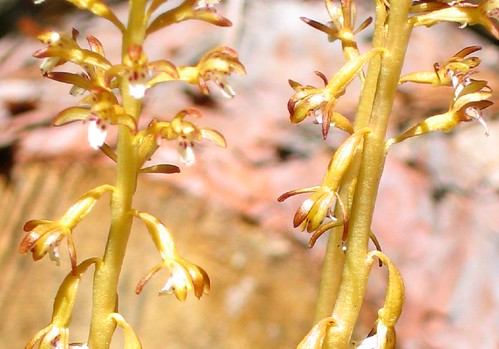
Corallorhiza maculata, spotted coralroot. St. Ignace, MI.
(*photo credit)
July 31, 2012 Earthhealing Has Ignatian Roots
The Feast of St. Ignatius of Loyola is an opportune time to consider the debt we owe to that saintly organizer for some of the Earthhealing principles we strive to apply. A companion reflection was on July 30, 2010 "Consider Ignatian Principles and the Environment." At that time we touched on five aspects: discerning good and bad movements of the spirits; gratitude for gifts of Earth; focusing on the Ignatian "Principle and Foundation" that Ignatius laid down at the beginning of the Spiritual Exercises; reflecting on the "Three Degrees of Humility" (being for the poor, being with the poor, and finally opting for being poor); and becoming an active Christian.
Let us extend the activistic mode to include the spiritual warrior in Ignatius, a late medieval soldier who gave up his sword to battle for good. This follows from the two preceding reflections this month (July 25-26) on democratic process. Though Ignatius' political views were closer to the Hispanic models of his time, still his Spiritual Exercises were meant for a broad spectrum of believers, and thus a democratic germ was starting to flourish.
The encouragement of people to be active comes in the total giving of ourselves to the Lord in the final meditations of these exercises when we recommit ourselves to take of Christ's work in an act of loving service. We seek to obey the Divine Will in all things for better or worse.
If we are willing to become poor with the Lord then we can muster the trust and courage needed to envision the titanic struggle between good and evil found in this world today. The conflict of the "Two Kingdoms" (of God and Satan) is the battle in which we are engaged between a materialism of the devil and a new messianic system. In that age to come all people receive the essential resources needed for a quality of life and still without damage to our planet through fair and proper processes of acquiring, use, distributing, and disposing. In order to prepare for this eco-spiritual revolution, we need to know our weaknesses and our social addictions, acknowledge them, surrender to a Higher Power, and find a close relationship with the Lord.
The active conflict in which we are presently engaged can find support in the manner of proceeding through the Spiritual Exercises, an immense tool for use in the coming decades as we seek to do two major goals: curtail climate change and its destructive effects; and redistribute the wealth of the world to those in desperate need. We begin by seeing the grandeur of all creation; we see victims who suffer with the crucified Christ; we see in our actions the joining in the venture to save our wounded Earth in the power of the resurrected Christ. This threefold vision of creation, redemption, and resurrection is part of the mysticism of Ignatius of Loyola, a mysticism akin to our Earthhealing.
Prayer: Lord, teach us to carry the Ignatian vision into a world needing transformation and to do so in due speed. |